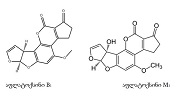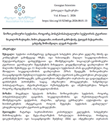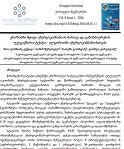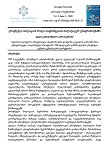Elimination of centrioles
Downloads
Centrioles, microtubule-based cylindrical structures, are pivotal for generating centrosomes, cilia, flagella, and somatic cells differentiation thereby supporting essential cellular functions such as motility, signaling, and tissue development. While known for their durability and ability to persist through multiple cell cycles, centrioles can undergo selective elimination under certain biological contexts. We have expanded our understanding of centriole dynamics, shedding light on the processes that regulate their assembly, stability, and eventual removal. This review examines diverse examples of centriole elimination across species and cell types, exploring the mechanisms that enable this transition from a stable organelle to a transient structure. Further insights into these processes could unlock new avenues for manipulating centriole behavior, with implications for both health and disease.
Downloads
Copyright (c) 2024 Georgian Scientists

This work is licensed under a Creative Commons Attribution-NonCommercial-NoDerivatives 4.0 International License.


























































































































































































































